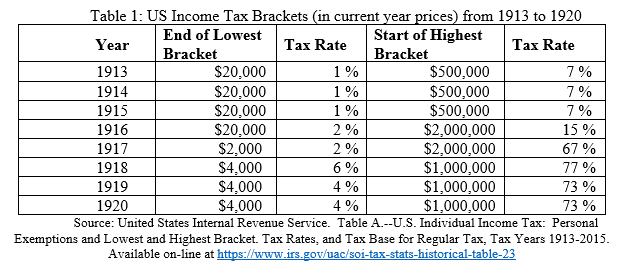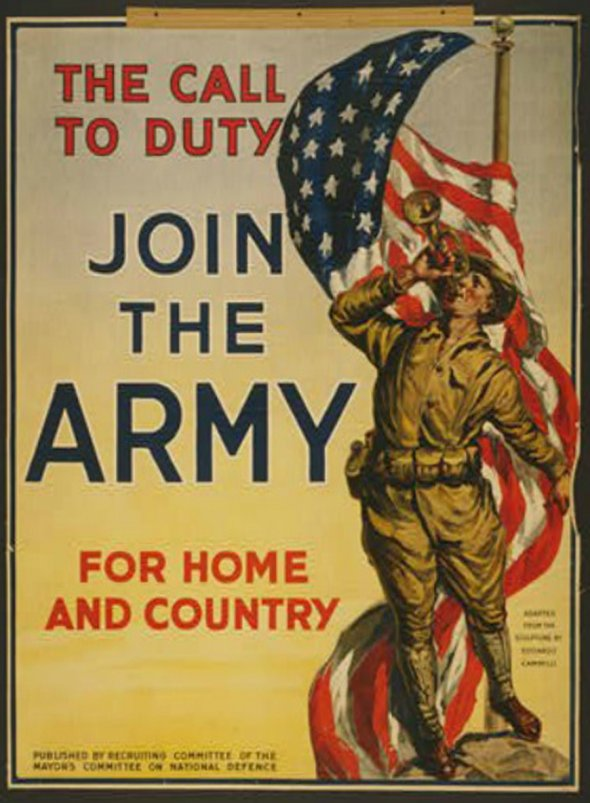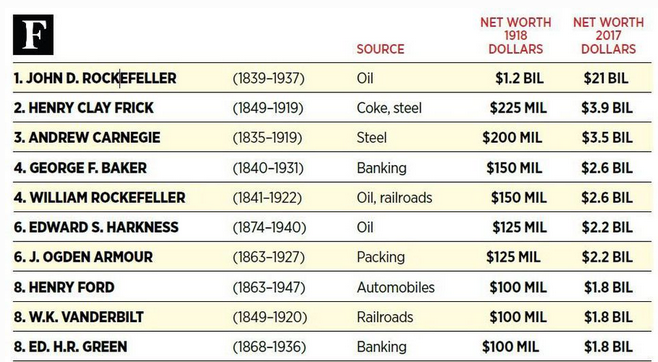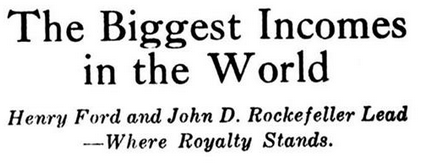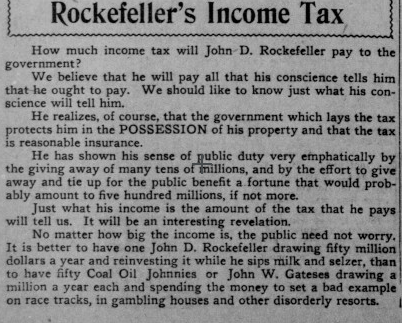And the kicker? the tax code was written with him and his family in mind.
You see, when the income tax went into effect in 1913, you essentially had to be a VERY well off household before you even STARTED to pay even a little bit of income tax.
$20,000 in 1913 = $500,000 in 2019
$20,000 in 1913 = $500,000 in 2019
So the lowest bracket dropped and the rate doubled (from 1% to 2%).
Now the lowest tax rate started at a "middle class" level
$2,000 in 1917 =$40,000 in 2019 https://www.minneapolisfed.org/about-us/monetary-policy/inflation-calculator">https://www.minneapolisfed.org/about-us/...
Now the lowest tax rate started at a "middle class" level
$2,000 in 1917 =$40,000 in 2019 https://www.minneapolisfed.org/about-us/monetary-policy/inflation-calculator">https://www.minneapolisfed.org/about-us/...
But what about the highest bracket? Notice it rose to $2 million (starting in 1916) and the rate soared to 67% (in 1917)
That& #39;s serious money!
$2 million in 1917 = $40 million in 2019
That& #39;s serious money!
$2 million in 1917 = $40 million in 2019
What determined the highest bracket? Who would have that that type of money?
Well, note that @Forbes published their first "Wealthiest Americans" list in 1918. #19902b644c0d">https://www.forbes.com/sites/chasewithorn/2017/09/19/the-first-forbes-list-see-who-the-richest-americans-were-in-1918/ #19902b644c0d">https://www.forbes.com/sites/cha...
Top of the list was a "who& #39;s who" of American capitalism: folks like Vanderbilt, Ford, Carnegie, and, yep, Rockefeller.
One caveat: the list was based on "net worth", not annual income.
Who was making $2million in annual income in 1917? According to @macleans article from that year, definitely Rockefeller & Ford
https://archive.macleans.ca/article/1917/12/1/the-biggest-incomes-in-the-world">https://archive.macleans.ca/article/1...
Who was making $2million in annual income in 1917? According to @macleans article from that year, definitely Rockefeller & Ford
https://archive.macleans.ca/article/1917/12/1/the-biggest-incomes-in-the-world">https://archive.macleans.ca/article/1...
When these brackets were adjusted, did anyone actually think that Rockefeller would pay the taxes?
It became a topic of much speculation.
Indeed, consider this article from the San Francisco Call in November 1913 (when the income tax came into effect)
Indeed, consider this article from the San Francisco Call in November 1913 (when the income tax came into effect)
At first, he tried to get around the tax by simply giving away most of this money.
Coincidental @RockefellerFdn started in 1913? https://abs.twimg.com/emoji/v2/... draggable="false" alt="🤔" title="Denkendes Gesicht" aria-label="Emoji: Denkendes Gesicht"> https://www.rockefellerfoundation.org/ ">https://www.rockefellerfoundation.org/">...
https://abs.twimg.com/emoji/v2/... draggable="false" alt="🤔" title="Denkendes Gesicht" aria-label="Emoji: Denkendes Gesicht"> https://www.rockefellerfoundation.org/ ">https://www.rockefellerfoundation.org/">...
Coincidental @RockefellerFdn started in 1913?
But he eventually did pay the tax, once loopholes were closed.
The sum was substantial enough that @nytimes reported on it. https://www.nytimes.com/1922/01/12/archives/rockefeller-pays-taxes-sends-391697-check-in-settlement-of-income.html">https://www.nytimes.com/1922/01/1...
The sum was substantial enough that @nytimes reported on it. https://www.nytimes.com/1922/01/12/archives/rockefeller-pays-taxes-sends-391697-check-in-settlement-of-income.html">https://www.nytimes.com/1922/01/1...
And the family would continue to pay taxes, even when, in the 1930s, John D Rockefeller Jr was the only American in the highest tax bracket https://ideas.time.com/2012/09/18/the-rich-havent-always-hated-taxes/">https://ideas.time.com/2012/09/1...
So while Rockefeller probably wasn& #39;t thrilled about paying income taxes, he did it.
I suppose that& #39;s what happens when you are a "sucker" that runs a thriving business enterprise.
[END]
I suppose that& #39;s what happens when you are a "sucker" that runs a thriving business enterprise.
[END]
Addendum 1: I expand a bit more on the World Wars-income tax linkage (including how it impacted Rockefeller) in this chapter for "Understanding War and Peace" textbook https://www.understandingwarandpeace.com/2017/12/10/economics-and-war/">https://www.understandingwarandpeace.com/2017/12/1...

 Read on Twitter
Read on Twitter![You know who was a "sucker" that paid taxes?John D. Rockefeller[THREAD] You know who was a "sucker" that paid taxes?John D. Rockefeller[THREAD]](https://pbs.twimg.com/media/EjALfhCXcAICPNf.png)
